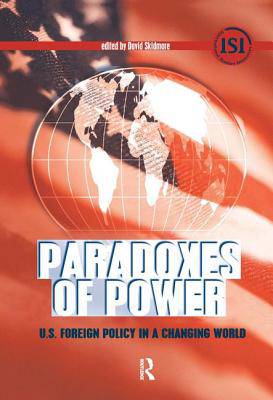
Je cadeautjes zeker op tijd in huis hebben voor de feestdagen? Kom langs in onze winkels en vind het perfecte geschenk!
- Afhalen na 1 uur in een winkel met voorraad
- Gratis thuislevering in België vanaf € 30
- Ruim aanbod met 7 miljoen producten
Je cadeautjes zeker op tijd in huis hebben voor de feestdagen? Kom langs in onze winkels en vind het perfecte geschenk!
- Afhalen na 1 uur in een winkel met voorraad
- Gratis thuislevering in België vanaf € 30
- Ruim aanbod met 7 miljoen producten
Zoeken
€ 290,45
+ 580 punten
Uitvoering
Omschrijving
This book provides a lively and readable introduction to current debates over U.S. power and purpose in world affairs. The end of the Cold War launched a new era in U.S. foreign policy. The United States entered a period of unprecedented global power, but one also characterized by new conflicts, challenges, and controversies. The terrorist attacks of 9/11 and the subsequent U.S. military operations in Afghanistan and Iraq cast a spotlight on continuing debates over how the United States should best use its considerable international power to secure safety for Americans and stability in the world. These debates involve two crucial questions: Should U.S. foreign policy focus on securing vital interests that are narrowly defined, or should the United States seek to spread U.S. institutions and values to other societies? Should the United States exercise maximum independence in the exercise of U.S. power abroad or work principally through multilateral institutions? This book brings together many different voices to answer these questions and to add to our understanding of the issues. Contributors include: Andrew J. Bacevich, Max Boot, Stephen G. Brooks, Ralph G. Carter, Robert F. Ellsworth, Niall Ferguson, Francis Fukuyama, Philip H. Gordon, Christopher Hitchens, James F. Hoge Jr., Michael Ignatieff, G. John Ikenberry, John B. Judis, Robert Kagan, Charles Krauthammer, Christopher Layne, Michael Mandelbaum, Joseph S. Nye, Jr., Minxin Pei, PEW Center for the People and the Press, Jeffrey Record, Paul W. Schroeder, Todd S. Sechser, Dimitri K. Simes, Stephen M. Walt, The White House, William C. Wohlforth
Specificaties
Betrokkenen
- Auteur(s):
- Uitgeverij:
Inhoud
- Aantal bladzijden:
- 297
- Taal:
- Engels
- Reeks:
Eigenschappen
- Productcode (EAN):
- 9781594514029
- Verschijningsdatum:
- 15/02/2007
- Uitvoering:
- Hardcover
- Formaat:
- Genaaid
- Afmetingen:
- 164 mm x 236 mm
- Gewicht:
- 530 g

Alleen bij Standaard Boekhandel
+ 580 punten op je klantenkaart van Standaard Boekhandel
Beoordelingen
We publiceren alleen reviews die voldoen aan de voorwaarden voor reviews. Bekijk onze voorwaarden voor reviews.









